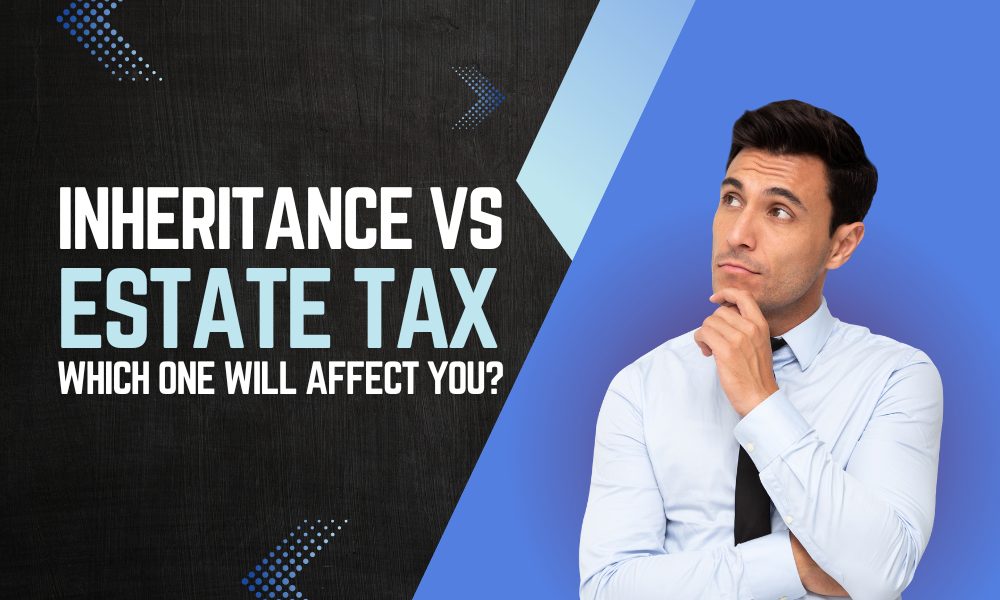




*For everyone’s safety we take phone appointments as well as in-person appointments*





*For everyone’s safety we take phone appointments as well as in-person appointments*
Did you know that in the US, only 0.2% of estates are subject to federal estate tax? While the majority of Americans won’t have to worry about it, understanding the difference between inheritance vs estate tax is still important. The terms may seem interchangeable, but they refer to two different death taxes with different tax implications.
In this article, we’ll break down the basics of inheritance vs estate tax, and help you understand which one may affect you and how to minimize your tax liability. So, whether you’re planning to leave a legacy or expect to inherit a property, read on to learn more about the nuances of inheritance vs estate tax.
Inheritance tax is one of the two death taxes, the other being estate tax. Inheritance tax is a tax on the assets and money received by the heirs or beneficiaries of an estate after the owner’s death.
This tax is imposed by the state government or federal government on the transfer of property from a deceased person to his or her heirs. The amount of tax paid is based on the value of the inherited assets.
Here are some key points to understand about inheritance tax:
It’s important to note that inheritance tax is different from estate tax. While inheritance tax is paid by the beneficiaries of the estate, estate tax is paid by the estate itself. In the next section, we will discuss estate tax in detail.
Estate tax, also known as inheritance tax or death tax, is a federal tax on the transfer of property after someone dies. This tax is calculated based on the value of the assets the deceased person leaves behind.
The estate tax only applies to estates that exceed a certain threshold, which is currently set at $12.92 million. This means that if the value of an individual’s estate is below this threshold, there will be no estate tax owed.
Here are some key things to know about estate tax:
Ultimately, estate tax can affect individuals who want to leave a legacy to their loved ones. If your estate is large enough to trigger the estate tax, it’s important to plan ahead and consult with professionals to minimize the impact of the tax on your estate.
The answer to whether inheritance tax or estate tax will affect you depends on your situation and where you live. Here are some factors to consider:

Inheritance tax is only enforced in certain states in the US, while estate tax is enforced at the federal level and in some states. Some countries have inheritance tax, while others have estate tax, or both
If you have a high net worth, estate tax may be a concern as it applies to the entire value of your estate. Inheritance tax usually only applies to the specific assets inherited.

Inheritance tax may differ depending on your relationship to the deceased, with spouses often exempt or receiving preferential treatment. Estate tax applies the same to all beneficiaries, regardless of their relationship to the deceased.
Estate tax can have a significant impact on the value of your estate, potentially reducing the amount you can leave as a legacy. Inheritance tax can also impact the amount you receive, but it is usually paid by the estate before distribution to beneficiaries.
If you’re concerned about your tax liability, there are a few things you can do to minimize it, including:
One of the most important things you can do to minimize your tax liability is to plan your estate carefully. This includes considering the tax implications of any assets you plan to leave to your heirs.
Trusts can be a useful tool for minimizing tax liability, especially if you expect to inherit a property. By placing assets in a trust, you can ensure that they are distributed to your heirs in a tax-efficient manner.
One way to reduce your estate’s tax liability is to give gifts to your heirs while you’re still alive. The IRS allows you to give up to a certain amount each year tax-free.
Estate planning can be complex, especially if you expect to inherit a property or have other complex assets. Seeking the advice of a qualified tax professional can help you minimize your tax liability and ensure that your assets are distributed in accordance with your wishes.
Understanding inheritance vs estate tax is crucial for anyone looking to leave a legacy or plan for their family’s future. While both taxes involve wealth transfer after death, there are important distinctions to be aware of. It’s important to keep in mind the tax implications when inheriting a property or other assets and to consider ways to minimize your tax liability.
If you do decide to sell your inherited property, remember that there are options available to you to make the process as simple and hassle-free as possible. Contact us at First Choice Home Buyers today to find out more about selling your home in the simplest way possible.
© Copyright 2024 FCHB Home Buyers – All Rights Reserved Privacy Policy.
to save your favourite homes and more
Log in with emailDon't have an account? Sign up
Enter your email address and we will send you a link to change your password.
to save your favourite homes and more
Sign up with emailAlready have an account? Log in